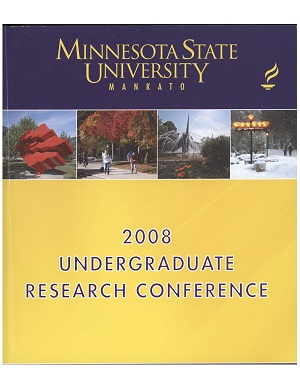Does Chronic Dieting Lower Resting Energy Expenditure Below That Estimated by Predictive Equations Thereby Increasing an Individuals Risk for Becoming Overweight or Obese
Location
CSU 201
Start Date
22-4-2008 10:30 AM
End Date
22-4-2008 12:15 PM
Student's Major
Human Performance
Student's College
Allied Health and Nursing
Mentor's Name
David Bissonnette
Mentor's Department
Family Consumer Science
Mentor's College
Allied Health and Nursing
Second Mentor's Name
Mary F. Visser
Second Mentor's Department
Family Consumer Science
Second Mentor's College
Allied Health and Nursing
Description
Although Americans are chronic dieters, more than two thirds of the US population is considered overweight or obese. Dieting alone may not be the answer to maintaining weight loss, and chronic dieting appears to lead to future weight gain. It was hypothesized that, in individuals who chronically diet, Resting Energy Expenditure (REE) is significantly lower than what predictive equations estimate.
Fifteen women, between the ages of 21 and 24, were classified into one of three groups-Controls (CN) with BMIs30-using a newly developed non-validated screening questionnaire. Weight changes-were measured over seven days while documenting daily dietary intakes using a web-based program [Diet Analysis Plus version 8]. The average daily caloric intakes were calculated and corrected for daily weight loss or gain. These values were then compared to those of the known predictive equations.
The CN group consumed a mean 30± 6.6 Kcal/Kg, whereas the obese subjects, as a whole, consumed a mean 16.94± 5.1 kcal/Kg representing 43.5% less calories per Kg body weight compared to CN. No statistical difference was observed between CDs and NCDs. Also, there was no statistical difference between predicted total calorie expenditures derived from the Mifflin, Harris-Benedict and Schofield equations. Caloric needs, expressed per Kg, appear to be significantly lower in obese individuals compared to non-obese or overweight individuals.
Does Chronic Dieting Lower Resting Energy Expenditure Below That Estimated by Predictive Equations Thereby Increasing an Individuals Risk for Becoming Overweight or Obese
CSU 201
Although Americans are chronic dieters, more than two thirds of the US population is considered overweight or obese. Dieting alone may not be the answer to maintaining weight loss, and chronic dieting appears to lead to future weight gain. It was hypothesized that, in individuals who chronically diet, Resting Energy Expenditure (REE) is significantly lower than what predictive equations estimate.
Fifteen women, between the ages of 21 and 24, were classified into one of three groups-Controls (CN) with BMIs30-using a newly developed non-validated screening questionnaire. Weight changes-were measured over seven days while documenting daily dietary intakes using a web-based program [Diet Analysis Plus version 8]. The average daily caloric intakes were calculated and corrected for daily weight loss or gain. These values were then compared to those of the known predictive equations.
The CN group consumed a mean 30± 6.6 Kcal/Kg, whereas the obese subjects, as a whole, consumed a mean 16.94± 5.1 kcal/Kg representing 43.5% less calories per Kg body weight compared to CN. No statistical difference was observed between CDs and NCDs. Also, there was no statistical difference between predicted total calorie expenditures derived from the Mifflin, Harris-Benedict and Schofield equations. Caloric needs, expressed per Kg, appear to be significantly lower in obese individuals compared to non-obese or overweight individuals.
Recommended Citation
Retzlaff, Elizabeth and Lynsey Wetzler. "Does Chronic Dieting Lower Resting Energy Expenditure Below That Estimated by Predictive Equations Thereby Increasing an Individuals Risk for Becoming Overweight or Obese." Undergraduate Research Symposium, Mankato, MN, April 22, 2008.
https://cornerstone.lib.mnsu.edu/urs/2008/oral-session-12/4




